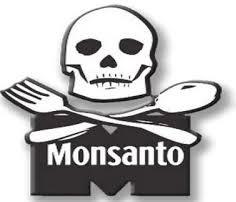 Glyphosate is a probable carcinogen, according to an international group of health experts. The International Agency for Research on Cancer (IARC) – a research arm of the World Health Organization – in March 2015 said glyphosate is a “probable” cancer-causing substance, a carcinogen. It’s a key ingredient in hundreds of crop-control agents and weed killers, such as Monsanto’s Roundup, Bronco, Glifonox, KleenUp, Ranger Pro, Rodeo, Weedoff.
Glyphosate is a probable carcinogen, according to an international group of health experts. The International Agency for Research on Cancer (IARC) – a research arm of the World Health Organization – in March 2015 said glyphosate is a “probable” cancer-causing substance, a carcinogen. It’s a key ingredient in hundreds of crop-control agents and weed killers, such as Monsanto’s Roundup, Bronco, Glifonox, KleenUp, Ranger Pro, Rodeo, Weedoff.
Monsanto challenges the finding (of course), and the Monsanto apologist U.S. EPA has long said glyphosate is safe for people, reaffirming that industry view in 2012.
Glyphosate is the most popular pesticide worldwide. Golf courses, home gardens, countless crop fields are routinely covered in it. It’s main use is in agriculture. Glyphosate is sprayed on genetically modified crops like corn, soy, cotton. These and other plants are ‘engineered” to resist the pesticide, which is used to kill weeds and bugs around them – including the favorable ones. Roundup kills virtually everything not genetically engineered to withstand its toxic assault.
Monsanto attacks Critics
Monsanto aggressively attacks critics with its friends in media and its well paid scientists, so, understandably, not too many people are brave enough to speak out against the company’s cancerous products.
Expert cautions
Aaron Blair, PhD, of the National Cancer Institute, and a lead researcher on the IARC’s study, is an exception. Blair said a panel of 17 scientists from around the world concluded glyphosate might be dangerous. They looked at all publicly available and published studies on the chemical and its relationship to cancer. (Unfortunately, the great majority of studies have been done by Monsanto itself and have studied only the active ingredient glyphosate, not the entire concoction with all its attendant adjuvants which always make any chemical concoction exponentially more toxic.) The information included studies on people, animals, laboratory cells. The panel did not consider reviews done by regulatory agencies.
Glyphosate Cancer Link
In three (3) out of the four (4) studies of American, Canadian, and Swedish agricultural workers, the IARC panel found a link between glyphosate and non-Hodgkin lymphoma, a cancer of the immune system. A fourth multi-year study of 80,000 American farmers showed no relationship, Blair says.
Kidney, Pancreatic Cancers
Animal studies showed a link between glyphosate and rare kidney and pancreatic cancers. Cell studies showed abnormal changes to cell DNA exposed to glyphosate. Blair said, the combination of all the studies led the IARC to conclude that it is a “probable” carcinogen.
“Probable means that there was enough evidence to say it is more than possible, but not enough evidence to say it is a carcinogen,” Blair said.“It means you ought to be a little concerned about” glyphosate.” (Web MD)
Level and Type of Glyphosate Exposure
Blair’s group did not consider the level and type of glyphosate exposure, and therefore could not say if glyphosate would “probably” cause cancer. That question is connected to the level and type of exposure.
Related
- Glyphosate a probable Carcinogen – Web MD
- Monsanto to invest 1 Billion to make poison Dicamba
- Monsanto Employees in U.S. Government
- Monsanto sued for False Advertising
- No Evidence GMOs are Safe says Norway
- France bans Glyphosate
- Monsanto sued for Water Contamination
- Monanto Lawsuit

by Matthews & Associates




